
News |
- Goldman Awards 2014
- Lake Winnipeg World's Most Threatened Lake
- Normal Weather Is Over
- Farley Mowat Dead at 92
- Manitoba to Ban Harmful Pesticides from Established Zones
- North Pacific Whales' Protection Downgraded
- Dene Nations Reject Northern Gateway
- First Nations Put LNG Plans on Notice
- CEC Issues Factual Records on Longstanding Complaints
- Hotel Proposed in Jasper National Park
- Pro Keystone XL Pipeline Comments Linked to Oil Industry
- IPCC 5th Assessment Report Confirming Climate Science
| Goldman Awards 2014 | 9 May 14 |

India's Ramesh Agrawal received the prize for helping villagers fight a large coal mine in Chhattisgarh state, the San Francisco-based Goldman Environmental Foundation said Monday. Peru's Ruth Buendia was recognized for helping to prevent construction of two large dams that would have displaced nearly 10,000 indigenous people in the Peruvian Amazon, and Russian zoologist Suren Gazaryan won for defending protected areas around Sochi from illegal land seizures for Olympic construction projects, it said. American lawyer Helen Slottje received the award for helping communities fight fracking in New York State by discovering a legal loophole that allows individual towns to ban the oil extraction method under zoning laws. South Africa's Desmond D'Sa won for helping to close down one of the country's largest toxic waste dumps, and Indonesian biologist Rudi Putra helped shutter 26 illegal palm oil plantations that were causing deforestation in northern Sumatra. "From fracking to palm oil development, the 2014 Goldman Prize recipients are not only tackling some of the world's most pressing environmental problems; they are also achieving impressive environmental victories and inspiring others to do the same," foundation executive director David Gordon said in a statement.
View April 30, 2014 The Atlantic article |
|
 Print version Print version |
Top |
| Lake Winnipeg World's Most Threatened Lake | 9 May 14 |
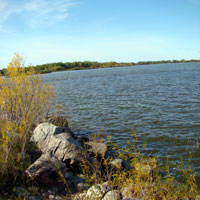
GNF was founded in spring in 1998 to foster the protection of nature and environment as well as animals. Despite relatively low populations in the Lake Winnipeg watershed (about 7.0 inhabitants per sq. km compared to nearly 230 inhabitants per sq. km in Germany) nutrients in industrial and agricultural run-off plus sewage discharges threaten Lake Winnipeg's future by stimulating large and frequent blue-green algae. These imbalance the lake's food chain and can be toxic to humans. Udo Gattenjohner, of the Global Nature Fund, said while Lake Winnipeg is one of the largest lakes in the world, it's "dramatic environmental problems" are less well known. Gattenjohner said "recent changes in Canadian polities seem to be eroding the protection, particularly of vulnerable water ecosystems – and it is disappointing because this does not really fit with our image of Canada."
View February 5, 2013 Global Post article |
|
 Print version Print version |
Top |
| Normal Weather Is Over | 9 May 14 |
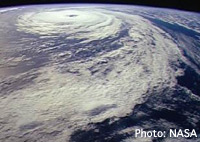
Due to a nearly two degree Fahrenheit rise in temperature throughout the U.S. the NCA climate report says Americans are experiencing water scarcity in dry regions, increasing torrential rains in wet ones, increasingly severe heat waves, worsening wildfires, and the death of forests as a result of heat-loving invasive insect species. Trip Van Noppen, President of Earthjustice had this to say about the NCA report; "The National Climate Assessment paints a bleak picture, but it is a picture we have seen clearly for many years, and we have to act on it now."
View May 6, 2014 Common Dreams article |
|
 Print version Print version |
Top |
| Farley Mowat Dead at 92 | 9 May 14 |

A descendant of Ontario's third premier, Mowat was born in Belleville, Ontario. and raised in Richmond Hill north of Toronto. His family relocated to Saskatoon in the early 30s where Mowat developed an interest in the natural world and wildlife. His most famous works included "The Dog Who Wouldn't Be" from 1957, "Owls in the Family" from 1961 and "Never Cry Wolf" from 1963. "Lost in the Barrens," published in 1956, won the Governor General's Award, while "The Boat Who Wouldn't Float" won the Leacock Medal for Humour in 1970. Mowat wrote 40 books, which were translated into 52 languages and sold more than 17 million copies worldwide. Mowat was made an Officer of the Order of Canada in 1981. His support to Sierra Club Canada was based on his 40 years relationship with Elizabeth May.
View May 8, 2014 Sierra Club Canada Farley Mowat: Legend page |
|
 Print version Print version |
Top |
| Manitoba to Ban Harmful Pesticides from Established Zones | 26 April 14 |

"It is not a matter of to spray of not to spray, but rather what you spray on your lawn" Minister Mackintosh stated. Clear rules outline which zones are to be sprayed with low-risk pesticides, with low-risk zones including private lawns, adjoining sidewalks or patios, school grounds, playgrounds, playing fields, and health and child-care centers. The minister clarified that the use of pesticides in forestry and agriculture would not be affected. Exemptions in areas where noxious and poisonous weeds cause health and environmental problems, will be in the bill. In 2013, public consultations confirmed that Manitobans support increased restrictions on pesticide use. "The benefits extend well beyond the immediate protection of pets and children to the environment itself, as fewer chemicals will leach and drain their way into provincial rivers, streams and lakes," said Gideon Forman, executive director of the Canadian Association of Physicians for the Environment.
View April 23, 2014 CBC News article Source:
Manitoba Government
|
|
 Print version Print version |
Top |
| North Pacific Whales' Protection Downgraded | 26 April 14 |
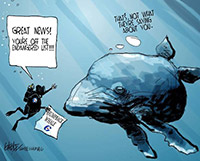 Larger Image
Source: The Globe and Mail
"It would be naive to think there was no connection. Environmental lawyers had already identified that the protections for the humpback whales under the SARA represented a hurdle, and by downgrading the protection of humpback whales they've removed that hurdle," said Green Party of Canada leader Elizabeth May. Species listed as 'threatened' under SARA have a legal right to protected habitat in order to promote successful population recovery. The high shipping traffic associated with the Enbridge Pipeline, expected to rise from 60 to over 400 ships a day off the BC coast, would violate that level of protection and therefore be an enormous obstacle to the approval of the pipeline. However, species listed as 'special concern' no longer require that habitat protection. "As environmentalists, we asked ourselves: 'how can the government protect the critical habitat of the humpback whale and allow tankers to go through it' and now we know how the answer to that. They're doing it by downgrading the species and dramatically reducing protection," said Gwen Barlee, policy director with Wilderness Committee. Removing that crucial factor from their recovery could have disastrous consequences. As the SARA species description states, "Vessel strikes are the most significant threat to Humpback Whales. In B.C. waters, Humpback Whales are the most commonly reported whale species involved in incidents with vessels. These interactions can cause injuries ranging from scarring to the mortality of individuals." The species' recovery strategy under SARA, unbelievably, does not yet exist. The federal government failed to propose recovery strategies after the species was formally listed as 'threatened', and missed mandatory deadlines by up to six and a half years.
View April 24, 2014 Huffington Post article Sources:
Huffington Post, iPolitics, Species at Risk Public Registry
|
|
 Print version Print version |
Top |
| Dene Nations Reject Northern Gateway | 26 April 14 |

Officials with the Canadian Environmental Assessment Agency, the National Energy Board and the Department of Fisheries and Oceans met with the four clans of the Yinka Dene in Fort St. James, and listened as dozens of elders, hereditary and elected chiefs said "No." The community leaders said the project is now banned from Yinka Dene territories, under their traditional laws. Members young and old of the Nadleh Whut'en, Nak'azdli, Saik'uz, Takla Lake, Tl'azt'en and Wet'suwet'en communities were unanimous. They said the decision by the four clans marks the end of negotiations.
View April 12, 2014 Vancouver Observer article |
|
 Print version Print version |
Top |
| First Nations Put LNG Plans on Notice | 26 April 14 |

In a written statement, Polak acknowledges First Nations were not adequately consulted about the proposed change prior to her Tuesday announcement. The order would have exempted prospective year-round ski resorts and new sweet natural gas plants in B.C. from the Environmental Assessment process. Union of B.C. Indian Chiefs Grand Chief Stewart Philip said the government had "effectively declared war on all BC First Nations and jeopardized all LNG discussions throughout the entire Province of BC." In Fort Nelson, First Nations drummed the government and industry out of a Liquid Natural Gas (LNG) conference following an impassioned speech from Fort Nelson Chief Sharleen Gale. "The word from my elders is it doesn't matter how they treat you," she told the conference from the podium. "You treat people kind. You treat them with respect even when they're stabbing you in the back. So I respectively ask government to please remove yourself from the room." Shortly after government officials left, the industry was also asked to leave.
View April 22, 2014 Vancouver Observer article |
|
 Print version Print version |
Top |
| CEC Issues Factual Records on Longstanding Complaints | 11 April 14 |
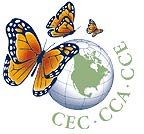
On 11 March 2014, the (CEC) agreed to make public the factual record concerning submission SEM-05-003 (Environmental Pollution in Hermosillo II), filed August 30, 2005, by Academia Sonorense de Derechos Humanos, A.C., and Domingo Gutiérrez Mendívil. The submission deals with an assertion that Mexico is failing to effectively enforce prevention, monitoring, oversight, and air pollution control provisions of various Mexican environmental laws in the city of Hermosillo, Mexico. On 11 March 2014, the Secretariat of the CEC submitted to the CEC Council a final factual record on submission SEM-04-005 (Coal-fired Power Plants). The submission was filed September 20, 2004 by ten Canadian and US environmental organizations, represented by Waterkeeper Alliance and Ecojustice (formerly Sierra Legal Defence Fund). The final factual record includes comments received from the Government of Canada on the accuracy of the draft factual record. In the Coal-fired Power Plants submission it is asserted the United States is failing to effectively enforce the federal Clean Water Act (CWA) against coal-fired power plants for mercury emissions that allegedly degrade thousands of rivers, lakes, and other water bodies across the US. Specifically, the Submitters assert the United States Environmental Protection Agency (EPA) has failed to effectively enforce water quality standard and total maximum daily load (TMDL) provisions of Section (§) 303 of the CWA, and permitting provisions required by the National Pollutant Discharge Elimination System (NPDES) pursuant to §402 of the CWA.
View Guidelines for Submissions on Enforcement Matters Source:
CEC
|
|
 Print version Print version |
Top |
| Hotel Proposed in Jasper National Park | 11 April 14 |
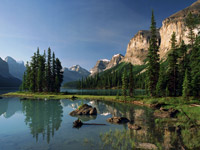
Source: malignelake.com
Maligne Lake, the world's second largest glacier fed lake, already experiences heavy tourist traffic due to its pristine natural beauty, however, all tourists must leave the lake by 5 PM. Maligne Tours states this hotel would allow for fuller enjoyment of the lake's beauty and would "enhance" the Maligne Lake experience. The trio of former Parks Canada experts advocate this large development would jeopardize exactly what the tourists come to see – undisturbed beauty and an abundance of wildlife. Sensitive species in the area include harlequin ducks, caribou and grizzly bear. A spokesperson for the Minister of the Environment indicated Parks Canada is reviewing the request to open Maligne Lake to the development, but no decision has been made.
View April 9, 2014 The Globe and Mail article Source:
The Globe and Mail
|
|
 Print version Print version |
Top |
| Pro Keystone XL Pipeline Comments Linked to Oil Industry | 11 April 14 |

In a random sample of more than 1,000 comments in support of the Keystone, about 60 percent of the commenters' names were connected to oil and pipeline company employees, investors, lobbyists, attorneys and others working for the industry–all of whom could potentially benefit from the construction of the pipeline, the activists said. If built, the pipeline would carry diluted bitumen from Canada's tar sands region to the Texas Gulf Coast. Building a pipeline that expedites and expands the world's dirtiest and most destructive oil mining project on the planet, puts landowners and precious natural resources at risk, and accelerates the release of dangerous climate-altering gasses is clearly not in the public's interest. It's in the interest of the oil industry, pure and simple.
View March 17, 2014 InsideClimate News article |
|
 Print version Print version |
Top |
| IPCC 5th Assessment Report Confirming Climate Science | 11 April 14 |
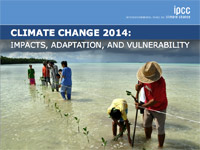
Climate Change 2014:Impacts, Adaptation, and Vulnerability, made special mention of Canada's role in the face of climate change. Observed changes to climate are attributed to human-induced causes with very high confidence. An example is the decreased snowmelt runoff in the mountains in North America. WGII's report also discusses the effects of climate change on the boreal forest fire regime, with ecosystems experiencing increased vulnerability from extreme wildfire activity and regional drought. The report continuously states with high to very high confidence, (95% confidence) that climate change is worsening and caused by human-induced activity. The third report of the Fifth Assessment deals with the mitigation of climate change, setting the technological, economic and institutional requirements that governments will have to incorporate on micro and macro scales in order to mitigate negative effects of climate change. The report is still undergoing completion, but a leak of WGIII's report reached the Guardian news agency, and apprehension towards the IPCC proposed mitigation measures is already surfacing among ecologists. A British environmental organization, Biofuelwatch, states that the third report's strong recommendation of untested and unreliable technologies such as bioenergy with carbon capture and sequestration (BECCS) is very worrisome. BECCS technology is not only risky, but has the potential to intensify climate change's negative effects identified in the first two IPCC Fifth Assessment reports such as erosion, water scarcity and agricultural problems.
View April 7, 2014 The Guardian article Sources:
The Guardian, IPCC
|
|
 Print version Print version |
Top |


 RSS Feeds:
RSS Feeds: